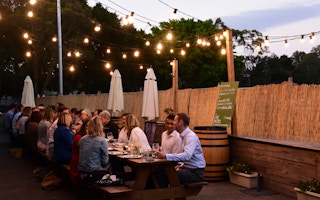The fight against food waste in Sydney received a boost on Wednesday with the launch of the Love Waste Collective, a start-up that aims to end wastage in the food business.
At a launch event in Sydney’s eastern suburbs Georgia Sheil, co-founder of the Love Waste Collective, told Eco-Business that the start-up was the result of a partnership between events catering company Dan the Man and a team of sustainability advocates.
“It emerged out of a need to look at the role of food and hospitality businesses in food waste,” she explained.
The company is currently consulting with Dan the Man achieve its goal of becoming Australia’s first event catering company to stage zero waste functions, said Sheil, who is also an engineer.
Speaking at the event, Ilana Cooper, co-director and head of community collaborations, Dan the Man, told the crowd of about 80 guests that the vision to achieve a zero-waste catering company “smashed (her) in the face” after a conversation about the issue with a local government leader, who urged Cooper to model solutions within her own firm.
Dan the Man aims for all its events to send zero waste to landfill by the end of 2018, and is already taking several measures to achieve this goal. These include: composting green waste in a community garden in Sydney’s Rose Bay suburb; getting suppliers to collect back and re-use the cardboard boxes that food is delivered in, and using cloth napkins made from off-cuts provided by a clothing manufacturer.
Steps that the company wants to take include signing a memorandum of understanding with suppliers to use minimal packaging for produce; sending soft plastics to a recycler; and using a bokashi bin—that is, a small composting system—to compost food that guests at an event leave uneaten.
“We are not there yet, but we are so encouraged by the support of our suppliers,” said Cooper.
Globally, about a third of all food produced is wasted. This means about 1.3 billion tonnes of food are needlessly discarded, costing the global economy some US$2.6 trillion. In stark contrast, about 800 million people globally suffer from chronic hunger.
In Australia, the federal government estimates that Australians generate more than 361 kilogrammes of waste per person every year. This costs households A$8 billion annually, and causes 6.8 million tonnes of greenhouse gas emissions as organic waste rots in landfills. Meanwhile, Over 644,000 people now receive food relief each month, one third are children, according to charity FoodBank.
The country’s government announced in April this year that it plans to slash food waste by half by 2030—this is a goal mirrored by a sub-target of the United Nations Sustainable Development Goal on sustainable consumption and production patterns—and is putting together a National Food Waste Strategy to address this issue.
Dan the Man and Love Waste Collective incorporated several solutions to reduce food waste and avoid generating trash at the launch event. In addition to using non-disposable dinnerware and napkins, the dinner menu featured a “nose to tail” concept that entailed serving up all parts of a whole lamb.
Guests were also encouraged to bring along unused fruit and vegetables from home, and a chef turned them into canapes for the event on the spot.
When it comes to scaling up the zero food waste culture, Love Waste Collective’s Sheil said that the company wants to work with large food, hospitality, and retail groups in Australia, “because any change they make is going to have a larger, systemic effect”.
Challenges along the way include behaviour change—getting people to change habits, imagine new and creative ways to avoid waste, and change expectations around the food experience—and infrastructure-related obstacles such as the presence of food waste recycling equipment and distribution networks to get excess food to where it is needed.
Sheil added that she would also like to see all local government councils in Sydney adopt uniform regulations on how to handle food waste.
“Big business like (supermarket chain) Coles operate in nearly every council district in Sydney, each of which have different regulations and options for food waste,” she said. “This makes it difficult to implement systemic, operational change.”
Sheil added: “Consistency is really important so that you have operations that are easy to follow, and can affect behaviour change.”
“By the end of next year, we’ll be celebrating the successes that we’ve had, and looking to partner with other companies”, Sheil shared. “We hope the industry responds well and takes food waste seriously as a genuine objective of their business.”

















